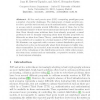24 search results - page 4 / 5 » Adaptive Spatial Reasoning for Turn-based Strategy Games |
ICRA
2010
IEEE
13 years 9 months ago
2010
IEEE
Multi-robot systems researchers have been investigating adaptive coordination methods for improving spatial coordination in teams. Such methods adapt the coordination method to th...
AAMAS
2007
Springer
13 years 11 months ago
2007
Springer
Abstract. Networked multi-agent systems are comprised of many autonomous yet interdependent agents situated in a virtual social network. Two examples of such systems are supply cha...
ICCBR
2010
Springer
14 years 2 months ago
2010
Springer
The concept of diversity was successfully introduced for recommender-systems. By displaying results that are not only similar to a target problem but also diverse among themselves,...
OTM
2007
Springer
14 years 5 months ago
2007
Springer
Ad hoc and peer-to-peer (P2P) computing paradigms pose a number of security challenges. The deployment of classic security protocols to provide services such as node authentication...
ROBOCUP
2004
Springer
14 years 4 months ago
2004
Springer
The paper discusses a top-down approach to model soccer knowledge, as it can be found in soccer theory books. The goal is to model soccer strategies and tactics in a way that they ...

